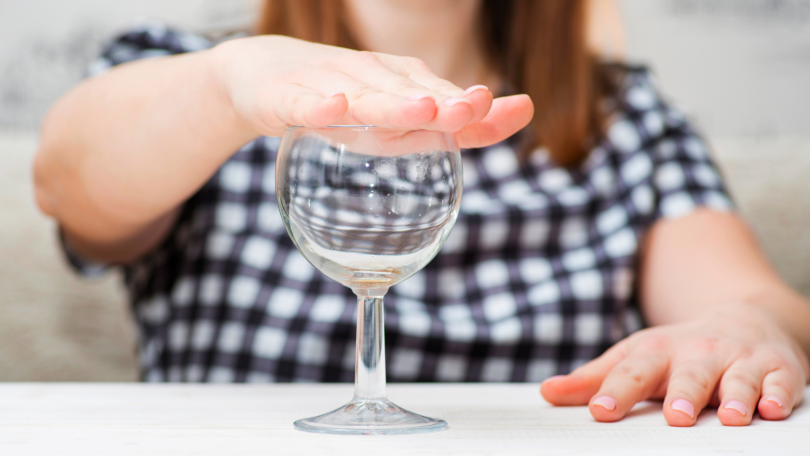Alcohol is a big part of our society, and it’s an area that many health professionals skirt around.

Photo by Giovanna Gomes on Unsplash
We’ve been conditioned to think that it’s socially acceptable to drink – and socially unacceptable to be a non-drinker.
Nobody really tells us that going alcohol-free will make a dramatic difference to both mental and physical peri- and menopausal symptoms.
When we start going through the hormonal shifts of peri- and menopause, the damaging effects of alcohol on our bodies and brains can become amplified.
In my clinic, I regularly see women in their 40s and 50s drinking more alcohol than is recommended – i.e. more than 14 units per week, which is just over 1 bottle of wine.
They drink to help them relax, to help them sleep, or to calm their anxiety. But ultimately, alcohol is depressant, it messes with your sleep, it worsens symptoms of anxiety, it plays havoc with your gut and hormones. This was part of my story too, so I understand how it feels to be trapped in this cycle.
How does alcohol affect us in peri- and menopause?
I’ve highlighted a few areas below:
Hormones
Alcohol disrupts the communication between the nervous, endocrine and immune systems, causing hormonal disturbances that can affect the entire body. Alcohol disrupts ALL of our hormones – sex hormones like oestrogen, testosterone, and progesterone; thyroid hormones; insulin; stress hormones like cortisol; plus the hormones that govern appetite and sleep. This may result in disorders such as:
- Adrenal dysfunction
- Disrupted circadian rhythm i.e. sleep problems
- Reproductive deficits – infertility, PMS, hormone-related cancers etc
- Thyroid imbalances
- Immune dysfunction
- Cardiovascular disease
- Bone disease
- Psychological and behavioural disorders
Nutrient Depletion
Alcohol depletes several vitamins and minerals that are vital for us to function properly – mentally and physically. This includes the fat-soluble vitamins A, D, E and K; vitamin C and all the B vitamins; and choline. Alcohol also depletes calcium, magnesium, iron, selenium and zinc, and essential fatty acids.
Disrupted Brain Chemistry
The brain is a major target for the actions of alcohol – it’s why we drink in the first place, to change how we feel. Alcohol interacts with serotonin, dopamine, GABA and acetylcholine receptors, leading to (or exacerbating) neurotransmitter imbalances. These imbalances can give rise to feelings of anxiety and panic, and can drive fatigue, mental fogginess, sleep difficulties, depression, impaired memory, and cravings (instinctively the brain will crave anything to correct those imbalances).
Gut Health
Excessive alcohol intake affects the microbial balance of the gut and damages the gut lining. This can lead to chronic low-grade inflammation which can show up as bloating, abdominal pain, cramping, constipation, diarrhoea, reflux and food intolerances. Gut dysfunction can also lead to symptoms like fatigue, brain fog, insomnia, mood swings, joint pain, depression, anxiety, skin conditions, as well as cravings and addictions
So there are plenty of good reasons to quit, or at least reduce, alcohol when going through the hormonal upheavals of peri- and menopause.
You don’t have to have a problem with alcohol to stop drinking. Sometimes, it just doesn’t serve us. And the menopause transition may be one of those times.
Don’t feel you have to do it alone – there are plenty of free resources and support groups online to help you on your way, and a vast selection of ‘quit lit’ (fiction and non-fiction books on the benefits of sobriety).




